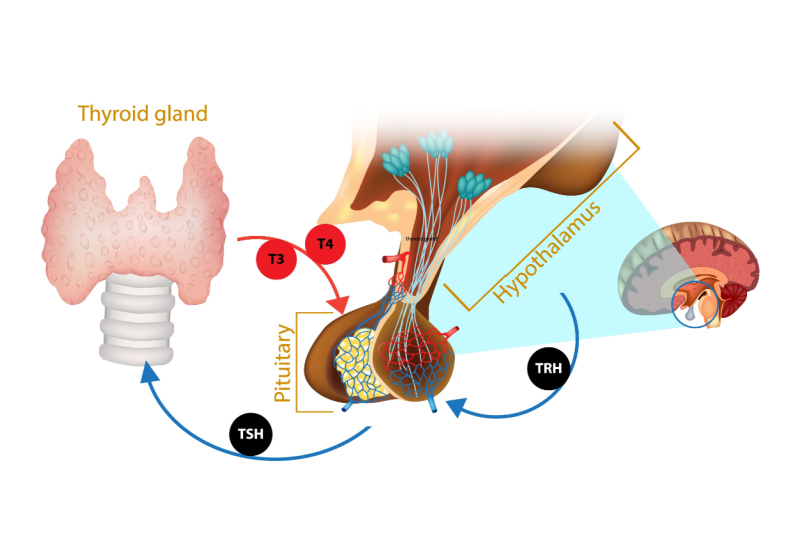Research Spotlight: The Effects of Micronutrients on Thyroid Health
Did you know that micronutrients play a vital role in thyroid health? While it’s common knowledge that these essential elements contribute to functions like energy production and immune defense, their link to the thyroid—a gland that touches nearly every body system—is often overlooked.
In this article, we’ll discuss the link between micronutrients and the thyroid, and explore pivotal research that underscores this relationship.
The Vital Role of Micronutrients

Micronutrients play varied roles in our body. They contribute to energy production, hemoglobin synthesis, maintenance of bone health, adequate immune function, and protection against oxidative stress and cellular damage.
A study by Vibrant Clinical Laboratory examined these connections, analyzing the micronutrient profiles of hundreds of participants and uncovering clear correlations between certain micronutrients and thyroid hormone levels, emphasizing the crucial interplay between these nutrients and thyroid health.
The Thyroid's Importance & Common Disorders
The thyroid, an endocrine gland responsible for producing and secreting thyroid hormones, regulates processes like respiration, heart rate, and reproductive function, to name a few.
It affects virtually every body system, typically enhancing function and metabolism.
Thyroid problems can negatively impact many body systems, causing weight fluctuations, neurological symptoms, or gastrointestinal issues.
When the thyroid is functioning properly, it secretes the appropriate amount of the thyroid hormones triiodothyronine (T3) and thyroxine (T4), driven by the thyroid-stimulating hormone (TSH) synthesized by the pituitary gland.
Any disruptions to this feedback loop can have catastrophic effects on the body—including thyroid disorders, which affect 5% to 6% of the US population.
Common thyroid disorders include:
- Hypothyroidism: reduced thyroid hormone production
- Hyperthyroidism: excessive thyroid hormone production
- Hashimoto’s disease: an autoimmune condition that causes hypothyroidism
A study from the Vibrant research team found that micronutrient imbalances—both shortages and surpluses—profoundly influence these disorders.
Thyroid Disruption Triggers
Factors that can trigger disruption include autoimmune disorders and certain influences such as your environment or age.
Another highly influential factor? Diet, specifically, the availability of certain micronutrients.
An abundance of research links iodine, selenium, vitamin D, and zinc to thyroid function and hormone expression.
However, other micronutrients, such as amino acids, cofactors, and metal ions, are rarely considered in scientific literature in terms of their potential effects on the thyroid.
Additionally, most studies only tested a few thyroid markers to determine effects on thyroid function.
The following study by Vibrant Clinical Laboratory fills in this knowledge gap and sheds new light on the relationship between a broader range of micronutrients and thyroid function and pathogenesis.
The Effects of Micronutrients on Thyroid Parameters

“Effects of Micronutrients on Thyroid Parameters” is a 2021 study published in the Journal of Thyroid Research.
The study took 387 healthy participants, 30% male, 70% female, aged 13-85, and tested them for eight different thyroid markers, including:
- Thyroxine (T4, a major thyroid hormone)
- Triiodothyronine (T3, a major thyroid hormone)
- Free T4 hormone (FT4)
- Thyroid-stimulating hormone (TSH)
- Free triiodothyronine (FT3)
- Antithyroid peroxidase (anti-TPO, an antibody which attacks an enzyme involved in thyroid hormone production)
- Reverse T3 (RT3, an inactive form of T3)
- Antithyroglobulin (anti-Tg, an antibody which attacks thyroglobulin, a protein involved in thyroid hormone production)
Researchers also tested the participants for 37 different micronutrients.
The Results
The study’s results demonstrated a clear correlation between many micronutrients, thyroid function, and hormone expression.
Amino Acids
Lower levels of amino acids such as asparagine, glutamine, serine, valine, citrulline, and arginine significantly impacted thyroid function by altering levels of thyroid hormones and TSH.
The deficiency of citrulline increased the serum levels of thyroid hormone T4, and low arginine levels decreased the serum levels of T3.
Vitamins
Thyroid functions were also significantly affected by various vitamin deficiencies. Vit B2, Vit B12, Vit B9(folate), and Vit-D25[OH] or calcidiol are the most influential for normal thyroid functioning.
Participants with low levels of vitamin B2 had much lower levels of the thyroid hormone T4.
The most significant factor affecting thyroid functioning was vitamin B9 or folate.
Based on the study’s results, folate deficiency increases levels of:
- TSH or thyroid stimulating hormone—a hormone produced by the pituitary gland that helps regulate thyroid hormone levels.
- Anti-TPO—TPO, or Thyroid Peroxidase, is an enzyme that powers thyroid hormone production. Anti-TPO is a type of antibody that attacks TPO.
- Anti-Tg—Tg or thyroglobulin is a protein found in the thyroid gland and is involved in thyroid hormone production. Anti-Tg is a type of antibody that attacks Tg.
Other Micronutrients
Lastly, micronutrients like calcium, copper, chromium, selenium, inositol, and carnitine also impacted thyroid function and thyroid hormone levels.
Researchers linked low carnitine levels to a notable increase in anti-TPO and anti-Tg, the antibodies that attack enzymes and proteins important for thyroid hormone production.
And it’s not just deficiencies that impact thyroid function. Micronutrient levels that are too high can also alter thyroid function.
High levels of inositol and copper were linked to a large increase in levels of T4 and T3. Further, increased levels of selenium were linked to a decrease in T3 and Free T3 levels.
Clinical Implications

The Vibrant Lab study demonstrates a strong relationship between a large group of micronutrients and thyroid function and hormone expression.
The thyroid is a delicate system that must maintain a precise balance of hormones for proper functioning. This system, which regulates the production and expression of thyroid hormones, works as a feedback loop.
Many parties are involved, including the hypothalamus, anterior pituitary gland, thyroid gland, and thyroid hormones T3 and T4.
Why does this matter? The study done by Vibrant Clinical Labs demonstrates that micronutrients can each individually impact different actors in this feedback loop. And when one is affected, so are the rest.
This all leads to dysregulated thyroid hormone production and altered thyroid functioning, which can trigger the development of thyroid disorders.
Thus, the study provides strong evidence that micronutrients may play a role in the development of diseases of the thyroid.
Evaluating Patient Health With Micronutrient Testing
To determine if your patients have healthy levels of nutrients, consider precision testing like the Micronutrient Panel.
This test will help you accurately assess your patients’ micronutrient levels, alerting you to any potential imbalance.
While addressing deficiencies, it's important to remember the delicate balance of micronutrients in the body. Overcompensating can be just as harmful.
Insights from the Micronutrient Panel will help you pinpoint which nutrients aren't being absorbed properly, which may be impacting thyroid function.
You can then create personalized treatment plans to address your patients’ specific needs.
The Micronutrient Panel detects direct levels of extra- and intracellular micronutrients by analyzing absorption at the gastrointestinal barrier and cellular membrane, so you can objectively determine root causes of malnutrition and inflammation.
The panel detects precise levels of:
- Vitamins
- Minerals
- Cofactors
- Amino acids
- Metabolites
- Antioxidants
- Essential fatty acids
Determining a patient’s nutrient status can help uncover a possible cause of thyroid dysfunction, as well as inflammation, neurological symptoms, digestive abnormalities, and more.
Micronutrients and thyroid health are inextricably linked. Vibrant’s study on the effects of micronutrients on thyroid parameters reveals that many micronutrients, not only a select few, can influence thyroid function and hormone production and expression. Micronutrient testing can illuminate if nutrient deficiencies or excesses are contributing to thyroid issues, allowing you to better understand thyroid pathogenesis and develop personalized interventions to improve patient outcomes.
“Effects of Micronutrients on Thyroid Parameters”
About the Author: Hari Krishnamurthy is the Director of Biomedical Engineering at Vibrant Labs. He strives to use his background in semiconductors and microchips to make a meaningful impact on healthcare.
Regulatory Statement:
The general wellness test intended uses relate to sustaining or offering general improvement to functions associated with a general state of health while making reference to diseases or conditions. This test has been laboratory developed and its performance characteristics determined by Vibrant America LLC and Vibrant Genomics, a CLIA-certified and CAP-accredited laboratory performing the test. The lab tests referenced have not been cleared or approved by the U.S. Food and Drug Administration (FDA). Although FDA does not currently clear or approve laboratory-developed tests in the U.S., certification of the laboratory is required under CLIA to ensure the quality and validity of the test
 By
By




